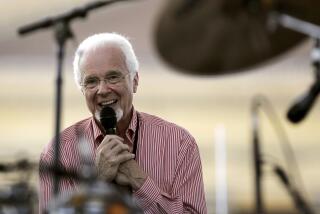Jazzman Phil Woods dies at 83; defined the sounds of bebop
- Share via
By the time Phil Woods stepped into the studio with Billy Joel, the saxophonist was already considered a legend among his contemporaries, a towering figure in bebop jazz.
But the pop song “Just the Way You Are,” with Woods’ piercing alto saxophone solo, made his sound instantly recognizable to the millions who listened to Top 40 music.
Woods, whom some considered the rightful heir to Charley “Bird” Parker and one of the iconic figures of modern jazz, died Tuesday from complications of emphysema, according to Joel Chriss, the musician’s booking agent. He was 83.
Although he had been suffering from the disease for some time, he continued to play, relying on a portable oxygen tank to complete performances. His final concert was Sept. 4 in Pittsburgh, where he performed his own version of Charlie Parker’s classic “Parker With Strings” with members of the Pittsburgh Symphony. When he finished, he announced it would be his final performance.
“There was a very specific reason why Phil played on nearly every album I’ve made since 1956, because he not only was the best jazz alto sax player there was, he was a truly beautiful person,” said Quincy Jones, whose collaboration with Woods dates to a State Department jazz tour with the Dizzy Gillespie Orchestra in 1956.
“It is an understatement to say Phil Woods was one of the greatest jazz alto-saxophone players to ever set foot on this planet.”
Arriving on the jazz scene in the late ‘40s, Woods was captivated by the fast-paced sound of bebop and quickly became familiar with the piquant harmonies and surging, offbeat rhythms of the music that was fast replacing the easygoing sounds and familiar memories of the Swing era. Musically adventurous, Woods was drawn to the compelling new chordal textures and the inventive possibilities that bebop provided.
Woods was especially influenced by the powerful new musical language of Parker – one of bebop’s principal innovators. The image of Woods inheriting Parker’s throne was further enhanced in 1958 when Woods married Parker’s widow, Chan. Years later, the marriage ended in divorce.
Philip Wells Woods was born Nov. 2, 1931, in Springfield, Mass. His first instrument was an alto saxophone, inherited from an uncle, and by the time he was in his teens he had already established himself as a local talent.
Woods moved to New York City in 1948 and took lessons with the iconoclastic pianist/composer Lennie Tristano and attended the Manhattan School of Music and Juilliard.
Although he is best known for his mastery of the alto saxophone, he played the clarinet as well. Moving articulately across the clarinet, he made the most of the instrument in both jazz and classical genres, a skill which served him well in his work as a big band and studio musician.
By the mid-’50s, Woods had become an established figure in the New York music scene. Playing in the saxophone sections of big bands led by Charlie Barnet, Quincy Jones, Dizzy Gillespie, Benny Goodman and others he was also a first call player for television and studio work.
In the ‘60s, he recorded with Benny Carter and toured Europe with the Thelonious Monk Nonet. Late in the decade, he moved to France, living in Paris and leading a band labeled the European Rhythm Machine, a group that moved beyond the bebop borders into the then-emerging avant-garde sounds of “free” jazz.
Woods may be best known to pop audiences for his alto saxophone work on Joel’s Grammy-winning “Just the Way You Are,” Steely Dan’s “Doctor Wu” and Paul Simon’s “Have a Good Time.”
His extensive recording career, which included nearly 50 albums, began in 1954 with his first album, “Pot Pie.” and ended in 2011 with “Man With the Hat.”
Woods was nominated for seven Grammy Awards, winning four. In 2007 he was named a National Endowment for the Arts Jazz Master, as well as a Living Jazz Legend by the Kennedy Center, and a frequent winner of Down Beat polls.
On receiving the NEA award, Woods said:
“Jazz will never perish. It’s forever music, and I like to think that my music is somewhere in there and will last, maybe not forever, but may influence others.”
Woods is survived by his wife Jill Goodwin; a son; a grandson; and three stepdaughters.
Don Heckman is a former Times jazz critic
More to Read
Sign up for Essential California
The most important California stories and recommendations in your inbox every morning.
You may occasionally receive promotional content from the Los Angeles Times.










